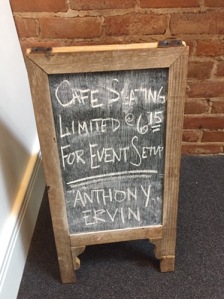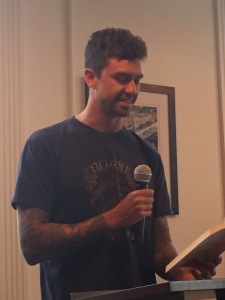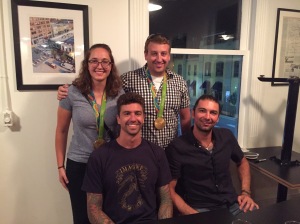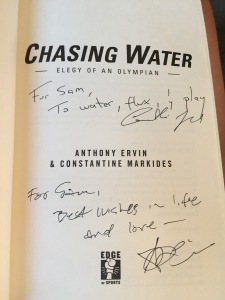I have a long history with this book. In college, I worked for a textbook rental click-and-mortar. We catered largely to the big state school on the other side of town. One of their freshman classes had to read this book. We had several hundred copies, more than we could rent. They filled the shelves and seemed to be part of every order at the beginning of the semester. But I never cracked it open. I knew the cover and author but nothing about what was inside the book. I was so excited when my book club selected the title. I was finally going to read ‘the orange book.’
The Immortal Life of Henrietta Lacks by Rebecca Skloot
Summary from Goodreads:
Henrietta Lacks, as HeLa, is known to present-day scientists for her cells from cervical cancer. She was a poor Southern tobacco farmer who worked the same land as her slave ancestors, yet her cells were taken without her knowledge and still live decades after her death. Cells descended from her may weigh more than 50M metric tons.
HeLa cells were vital for developing the polio vaccine; uncovered secrets of cancer, viruses, and the atom bomb’s effects; helped lead to important advances like in vitro fertilization, cloning, and gene mapping; and have been bought and sold by the billions. Yet Henrietta Lacks was buried in an unmarked grave.
The journey starts in the “colored” ward of Johns Hopkins Hospital in the 1950s, her small, dying hometown of Clover, Virginia — wooden slave quarters, faith healings, and voodoo. Today are stark white laboratories with freezers full of HeLa cells, East Baltimore children and grandchildren live in obscurity, see no profits, and feel violated. The dark history of experimentation on African Americans helped lead to the birth of bioethics, and legal battles over whether we control the stuff we are made of.
This was one of those non-fiction books where you think it has to be made up. Henrietta’s story is so bizarre and Skloot tells it in a very conversational way. She made advanced science readable and used the story of the Lacks family to bring the debate on cell and DNA ownership to a point that’s hard to ignore. It wove through time well and told a good parallel story between the modern ramifications of Henrietta’s cancer both good and bad.
Skloot brought the Lacks family alive for me, especially Deborah and Zakariyya. It’s obvious Skloot and Deborah had a special relationship and I loved how respectful Rebecca was of the family and how she earned their trust. She became her own character in the story, a surprise to me. I liked that her journey to finding the history and truth was a part of the history.
George Gey was the most interesting person to me. He was a villain to the Lacks family but in his field, he was a pioneer. He never patented his discoveries in cell culture and he didn’t charge colleagues for samples of Henrietta’s cells at first. He went into debt to advance science. I thought it was a great anecdote that when he was undergoing surgery, he wanted his cells put into a culture so he could have a GeGe strain. That made him seem very much a crazy scientist.
The confusion Deborah and her family faced when it came to understanding her mother’s cells struck me. It reminded me of trying to understand biology growing up and I was so moved by Deborah’s thirst to learn as much as she could and make sure her children learned.
I was moved when Deborah and Zakariyya went to see HeLa cells at Johns Hopkins. I thought it was so great of Lengauer to take the time and show her children what their mother’s cells had done for science and to show them what of her was still around. He had to be very patient but I’m sure for him, it was like meeting a celebrity. What an amazing experience.
Reading about Henrietta’s early life was hard for me. The sexual abuse, living conditions, and attitudes of her family as she grew up and started her family were rough. No part of me envied her. It was worse seeing some of those attitudes and behaviors perpetuated into the later generations, like when Deborah’s son was sent to jail. Knowing that the lives of people can be so difficult as an abstract idea is hard enough but reading about the details of it is so much worse.
The biggest lesson I got from this book was giving. Henrietta was always giving of her food and her home. Gey was giving of his knowledge. Deborah learned to be giving of herself and respect what her mother did for science. That was the hardest lesson for her family to learn and it took them a long time to come to terms with it. I think Deborah had to teach them that lesson because Henrietta wasn’t there to do it herself.
Writer’s Takeaway: I loved Skloot’s ability to weave history, modern narrative, and her own journey into one book. It was fun to read and I learned a lot. History is only boring if you write it in a boring way. Skloot did a wonderful job of bringing the past alive and weaving it with an adventure.
Enjoyable and educational. Four out of Five stars.
Until next time, write on.
You can follow me on Goodreads, Facebook, Twitter, Pinterest, and Instagram. I’m available via email at SamAStevensWriter@gmail.com. And as always, feel free to leave a comment!
Related Posts:
Review: ‘The Immortal Life of Henrietta Lacks’ by Rebecca Skloot | Ephemereality




 Currently reading: I made some minor progress on
Currently reading: I made some minor progress on  Recently finished: I finished
Recently finished: I finished  Reading Next: I’m going to get a jump-start on my next book club book. We’re reading
Reading Next: I’m going to get a jump-start on my next book club book. We’re reading 
 Currently reading: Again, nothing with
Currently reading: Again, nothing with  Reading Next:
Reading Next:  Flash forward not even a week. I got the monthly newsletter from
Flash forward not even a week. I got the monthly newsletter from

 It was such a cool night and a great chance to meet a swimming legend. It even brought in my love of books which was even better! This was the first time I went to a book signing for an athlete but I think it was a good experience for me. Maybe there will be more of these in the future? Maybe.
It was such a cool night and a great chance to meet a swimming legend. It even brought in my love of books which was even better! This was the first time I went to a book signing for an athlete but I think it was a good experience for me. Maybe there will be more of these in the future? Maybe.

 Recently finished: Two done! The first is
Recently finished: Two done! The first is 